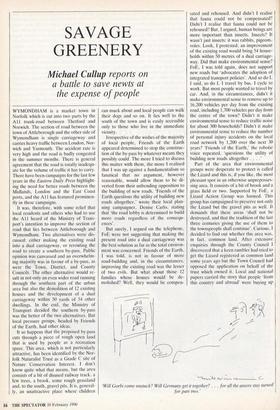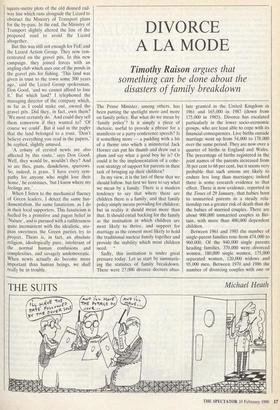SAVAGE GREENERY
Michael Cullup reports on
a battle to save newts at the expense of people
WYMONDHAM is a market town in Norfolk which is cut into two parts by the All trunk-road between Thetford and Norwich. The section of road between the town of Attleborough and the other side of Wymondham is single carriageway and carries heavy traffic between London, Nor- wich and Yarmouth. The accident rate is very high and the road is badly congested in the summer months. There is general agreement that the road is totally inadequ- ate for the volume of traffic it has to carry. There have been campaigns for the last few years in the Eastern Daily Press highlight- ing the need for better roads between the Midlands, London and the East Coast ports, and the All has featured prominen- tly in these campaigns.
It was, therefore, with some relief that local residents and others who had to use the All heard of the Ministry of Trans- port's intention to improve the section of road that lies between Attleborough and Wymondham. Two alternatives were dis- cussed: either making the existing road into a dual carriageway, or rerouting the road to create a southern by-pass. Public opinion was canvassed and an overwhelm- ing majority was in favour of a by-pass, as were the Town, District, and County Councils. The other alternative would re- sult in not only an even wider road running through the southern part of the urban area but also the demolition of 12 existing houses and the development of a dual carriageway within 50 yards of 54 other dwellings. In the end, the Ministry of Transport decided the southern by-pass was the better of the two alternatives. But local pressure groups, headed by Friends of the Earth, had other ideas.
It so happens that the proposed by-pass cuts through a piece of rough open land that is used by people as a recreation space. This area, which is not particularly attractive, has been identified by the Nor- folk Naturalist Trust as a Grade C site of Nature Conservation Interest. I don't know quite what that means, but the area consists of a bit of disused railway track, a few trees, a brook, some rough grassland and, to the south, gravel pits. It is, general- ly, an unattractive place where children can muck about and local people can walk their dogs and so on. It lies well to the south of the town and is easily accessible only to those who live in the immediate vicinity.
Irrespective of the wishes of the majority of local people, Friends of the Earth appeared determined to stop the construc- tion of the by-pass by whatever means they possibly could. The more I tried to discuss this matter with them, the more I realised that I was up against a fundamentalism so fanatical that no argument, however reasonable, would allow them to be di- verted from their unbending opposition to the building of new roads. 'Friends of the Earth questions the utility of building new roads altogether,' wrote their local plan- ning campaigner, Denise Carlo, stating that 'the road lobby is determined to build more roads regardless of the consequ- ences'.
But surely, I argued on the telephone, FoE were not suggesting that making the present road into a dual carriageway was the best solution as far as the total environ- ment was concerned. Friends of the Earth, I was told, is not in favour of more road-building and, in the circumstances, improving the existing road was the lesser of two evils. But what about those 12 families whose houses would be de- molished? Well, they would be compen-
sated and rehoused. And didn't I realise that fauna could not be compensated? Didn't I realise that fauna could not be rehoused? But, I argued, human beings are more important than insects. Insects? It wasn't just insects: it was rabbits, pigeons, voles. Look, I protested, an improvement of the existing road would bring 54 house- holds within 50 metres of a dual carriage- way. Did that make environmental sense? FoE, I was told again, does not support new roads but 'advocates the adoption of integrated transport policies'. And so do I, I said, so do I. I travel by bus. I cycle to work. But most people wanted to travel by car. And, in the circumstances, didn't it make environmental sense to remove up to 16,200 vehicles per day from the existing road, including 1,700 vehicles per day from the centre of the town? Didn't it make environmental sense to reduce traffic noise for about 300 households? Didn't it make environmental sense to reduce the number of personal injury accidents on the local road network by 1,200 over the next 30 years? 'Friends of the Earth,' the robotic voice repeated, 'questions the utility of building new roads altogether . . .
Part of the area that environmental groups were desperate to protect is called the Lizard and this is, if you like, the most pleasant spot in an otherwise unpreposses- sing area. It consists of a bit of brook and a grass field or two. Supported by FoE, a Lizard Action Group was formed. This group has campaigned to preserve not only the Lizard but the gravel pits as well. It demands that these areas 'shall not be destroyed, and that the tradition of the last three centuries giving the use of them to the townspeople shall continue'. Curious, I decided to find out whether this area was, in fact, common land. After extensive enquiries through the County Council I discovered that a keen rambler had tried to get the Lizard registered as common land some years ago but the Town Council had opposed the application on behalf of the trust which owned it. Local and national papers carried the story that people 'from this country and abroad' were buying up
'Will Gorbi come unstuck? Will Germany get it together? . for all the ansers stay turned for part two.'
square-metre plots of the old disused rail- way line which runs alongside the Lizard to obstruct the Ministry of Transport plans for the by-pass. In the end, the Ministry of Transport slightly altered the line of the proposed road to avoid the Lizard altogether.
But this was still not enough for FoE and the Lizard Action Group. They now con- centrated on the gravel pits. In this new campaign, they joined forces with an angling club which uses one of the ponds in the gravel pits for fishing. 'This land was given in trust to the town some 300 years ago,' said the Lizard Group spokesman, Don Good, 'and we cannot afford to lose it.' But which land? I telephoned the managing director of the company which, as far as 1 could make out, owned the gravel pits. Did they, in fact, own them? 'We most certainly do.' And could they sell them tomorrow if they wanted to? 'Of course we could'. But it said in the paper that the land belonged to a trust. 'Don't believe everything you read in the papers,' he replied, slightly amused.
'A colony of crested newts are also affected by this route,' says Don Good. Well, they would be, wouldn't they? And so are flies, gnats, dandelions, sparrows. So, indeed, is grass. 'I have every sym- pathy for anyone who might lose their home,' he continues, 'but I know where my feelings are.'
When I listen to the mechanical fluency of Green leaders, I detect the same fun- damentalism, the same fanaticism, as I do in their local supporters. This fanaticism is fuelled by a primitive and pagan belief in 'Nature', and is pursued with a ruthlessness quite inconsistent with the idealistic, uto- pian sweetness the Green parties try to project. Theirs is, in fact, an absolute religion, ideologically pure, intolerant of the normal human confusions and complexities, and savagely undemocratic. When newts actually do become more important than human beings, we shall really be in trouble.



















































 Previous page
Previous page